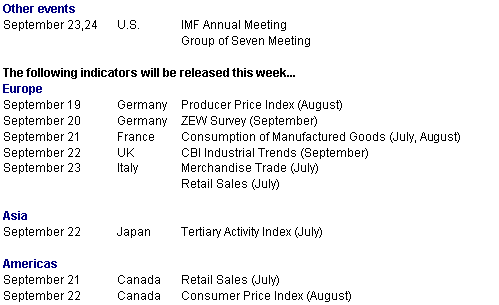Monday, September 19, 2005

Global Markets
Equities were mixed last week. While Japanese investors celebrated the outcome of their election, voters in Germany looked forward to their results with apprehension given the prospects of no clear majority for the prospective winner. As a result, the Nikkei and Topix were up on the week while the DAX was down. Stocks were also down in the U.S. and Hong Kong. The euro was also affected by the prospects of a coalition government in Germany while the yen initially was up after the election, but then steadily lost ground during the week as focus shifted to the usual suspects - growth, U.S. deficits and oil prices.
On Friday, gold moved near an 18-year high. Bullion peaked at $458.80 a troy ounce in early (London) trading, moving towards a level not seen since December 1987. Speculators were continuing to buy gold as they bet that the dollar might have further to fall. The increase came despite weakness in the euro. Gold normally moves in tandem with the single currency, but it has de-coupled on several occasions this year as investors have attempted to value the precious metal as a currency. This is the longest bull market run for bullion since it was freely floated in 1968. The metal's fortunes turned around in the summer of 2001 when it hit a 22-year low of almost $250 a troy ounce. The increase is largely the result of a decline in the dollar.

Global Stock Market Recap

Europe and Britain
German stocks have been climbing since May amid speculation that there would be a change in government after September 18th's national election. But they slumped last week after polls showed that the opposition might fail to win an outright majority. The polls showed that opposition leader Angela Merkel's Christian Democratic Union and its Bavarian affiliate, the Christian Social Union, may fail to capture enough seats in parliament to form a majority government with their preferred partner, the Free Democrats. Merkel has pledged to stimulate the economy by reducing labor costs and cutting taxes. Her proposals helped the DAX Index rise above 5,000 this month for the first time in more than three years. The poll results suggest she might have to share power with Chancellor Gerhard Schroeder's Social Democratic Party, hurting her ability to govern. The DAX is up 15 percent since May 22nd, when Schroeder called for elections a year ahead of schedule. The index has outperformed both the CAC and FTSE since.

Since Schroeder was first elected as Germany's chancellor on Sept. 27, 1998, the DAX has risen just 7.5 percent. Under his leadership, the economy grew less than 1 percent in three of the past four years. The 11.6 percent unemployment rate in August was near a post- World War II record.
Both the CAC and FTSE were up last week. The main stimulus was merger activity along with help from mining and oil company stocks. The FTSE ended the week above 5,400 for the first time since the end of August 2001 while the CAC was above the 4,500 level for the first time since the first week of September 2001.

Asia/Pacific
All Asia/Pacific indexes followed here were up on the week with the exception of the Hang Seng. Japanese shares celebrated Prime Minister Junichiro Koizumi's victory in the national elections driving the Nikkei to a new four-year high until investors took profits on the higher stock prices. Commodities and materials producers as well as domestically focused companies and some tech stocks all contributed to the gains. Oil stocks were boosted by higher oil prices.
The vote extended his four-and-a-half-year term and gave him a mandate to sell portions of the state-owned Japan Post, the world's biggest financial institution. Koizumi had called the elections when the upper house of parliament last month rejected a bill to sell Japan Post, which has the equivalent of $3.2 trillion in savings accounts and insurance policies. Japanese stocks have soared since August 8th, when the election was announced. The Prime Minister has repeatedly said that he would step down in September 2006 regardless of the outcome. The election result was seen as a vindication for Koizumi's reforms. Japan Post is the biggest holder of public debt with ¥140 trillion in government bonds or about a fifth of the total outstanding. Koizumi proposed splitting Japan's largest employer into separate units to manage savings, insurance, mail and its 24,700 branches before selling it off from April 2007.

The Japanese public remains deeply pessimistic about the future of the economy and concerned about falling incomes, rising taxes, reduced pensions and unemployment despite two years of economic growth and rising consumer spending, according to a Bank of Japan survey. Although consumer spending has risen, the majority of those surveyed said they had cut spending because they were worried about a future cut in their incomes, a reduction in social security or pension payments, and tax increases.
Currencies
The yen rallied against the dollar in the run up to the general election. But the currency ebbed lower after the initial euphoria and attention shifted to other issues such as the ramifications of Katrina on U.S. growth and inflation. The yen declined on Friday because of the lower-than-expected U.S. current account deficit combined with data that showed increased investment in U.S. assets.

The euro waffled as analysts weighed the possible election outcomes in Germany and the prospects for reform should there be no clear majority. Concerns that the poll may not deliver a decisive victory for the central right CDU and instead require the formation of a grand coalition have contributed to increasing uncertainty about the prospects for economic reform in Germany. The euro ended the week lower.

The pound sterling was hit by weaker-than-expected retail sales data on Thursday. The data stirred speculation that the Bank of England might need to cut interest rates again to stimulate consumer spending. The Bank of England is due to release the minutes of the September 8th Monetary Policy Committee meeting on Wednesday. The vote was split five to four in August when the MPC voted to reduce rates by 25 basis points to 4.5 percent. Analysts will want to see if the committee remains split.

Indicator scoreboard
EMU - July industrial output was up 0.2 percent and 0.5 percent when compared with last year. The increase was due primarily to a jump in German output. Intermediate goods output was up 0.8 percent while consumer nondurable goods edged up 0.3 percent and capital goods, 0.2 percent. Output was down for energy goods and consumer durable goods, 0.7 percent and 0.5 percent respectively.

August harmonized index of consumer prices was up 0.3 percent and 2.2 percent when compared with last year. Falling prices of clothes, phone calls and food partially offset a surge in fuel and transport prices. Excluding energy, the HICP was 1.3 percent higher from a year ago. The core inflation rate, which excludes food and tobacco prices as well as energy, was also up 1.3 percent on the year.

France - July seasonally adjusted merchandise trade deficit exploded to €2.7 billion from a deficit of €1.3 billion in June. This was the 16th monthly trade deficit in a row. Exports sank 3.3 percent. All main categories were down except transportation equipment and oil products. Imports were up 1.2 percent after sinking by 1.9 percent in June. The gain was on surging energy imports combined with higher prices.

Italy - July seasonally and workday adjusted industrial production was up 0.5 percent but declined 0.9 percent when compared with last year. Consumer goods output was up 1.4 percent while investment goods output was up by 0.7 percent on the month.

Britain - August producer output price index was up 0.3 percent and 3 percent when compared with the same month a year ago. The monthly increase reflects price increases for petroleum and other manufactured products. Core output prices, which exclude food, beverages, tobacco and petroleum, were up 0.1 percent and 1.9 percent on the year. Input prices were up 1.1 percent and 12.9 percent on the year. Core input prices were down 0.6 percent but up 6.9 percent on the year.

August consumer price index was up 0.4 percent and 2.4 percent when compared with last year and its highest level since 1997. Transport costs including gasoline along with food and non-alcoholic beverages were also up. Recreation and culture prices were down. The CPI is used by the Bank of England as their inflation measure. Their current target is 2 percent. The Retail price index excluding mortgage interest payments was up 0.2 percent and 2.3 percent on the year.

August claimant unemployment was up by 1,600 but the claimant unemployment rate remained at 2.8 percent for the third month. The claimant count measures those who are out of work and claiming an unemployment benefit. The International Labour Organization unemployment - the official unemployment measure - for the three months ending in July was up by 12,000 over the previous three months. The unemployment rate was 4.8 percent. The proportion of people of working age who wanted to work rose to 78.6 percent after a small dip in the spring.

Average earnings for the three months ending in July was up 4.2 percent when compared with the same three months a year ago. The increase was due to bonus payments. Average earnings excluding bonuses were up 4 percent.
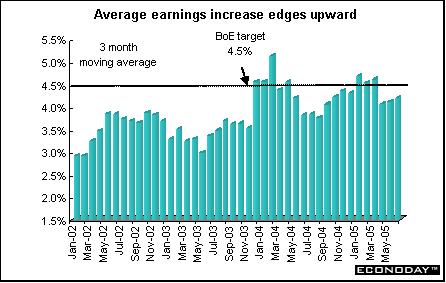
August retail sales volumes were flat but were up 0.8 percent when compared with last year. Food sales sank 1.2 percent and more than offset an increase of 0.8 percent in non-food sales. Non-specialized store sales were up 1.4 percent and non-store retailing and repair sales were up 1.3 percent and 1 percent respectively.
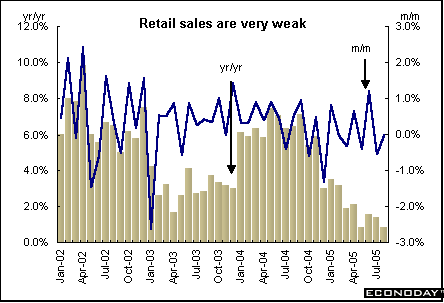
Asia
Japan - Second quarter gross domestic product growth was revised upward to 0.8 percent from the original estimate of 0.3 percent. GDP was up 2.2 percent when compared with last year. The annualized rate of growth was 3.3 percent. Private consumption was up 0.6 percent while private non-residential investment was up 3.6 percent. The GDP deflator was down 0.9 percent.
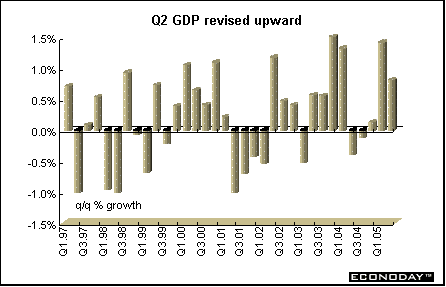
August corporate goods price index was up 0.2 percent and 1.7 percent when compared with last year. Product prices at the wholesale level have been rising on a month-on-month basis since July 2003 due primarily to soaring commodity prices.
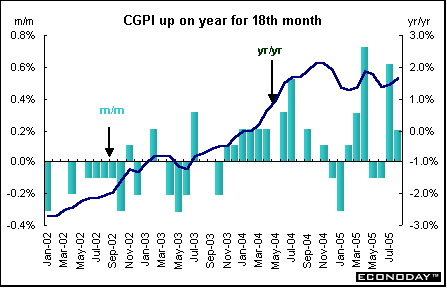
Americas
Canada - July merchandise trade surplus soared to C$5.82 billion from C$4.87 billion in June. The ballooning surplus is largely due to soaring petroleum exports. Exports were up 2.1 percent but imports dropped by 0.5 percent. The trade surplus with the United States was C$8.8 billion, up from C$8.2 billion in June. Exports were up 2.4 percent while imports climbed by 0.2 percent.
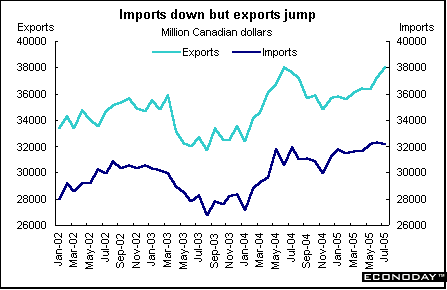
July manufacturing shipments sank 1.4 percent and were down 1.3 percent when compared with last year. Sixteen of 21 industries accounting for 92.5 percent of total shipments posted declines. July is the month when some factories slow production for annual employee vacations, introduce product changes on assembly lines and carry out maintenance shutdowns. New orders dropped 0.4 percent and were down 0.4 percent on the year as well. Unfilled orders, however, jumped 2.4 percent and were up 9.8 percent on the year. The railroad rolling stock, aerospace products & parts and motor vehicle industries contributed to the rise in orders overall. With the July release, all data have been re-benchmarked to the revised 2001 Annual Survey of Manufactures (ASM).
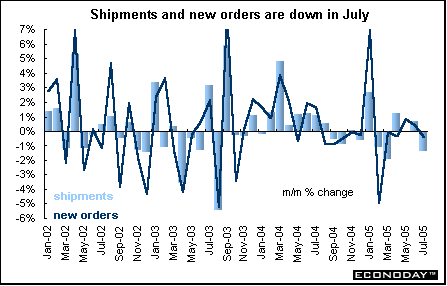
Bottom line
The outcome of Tuesday's Federal Reserve Open Market Committee meeting is the key market event this week and will probably have a major impact on currencies. Although most economists think the FOMC will continue on its path of measured increases, there is a vocal minority who think the Fed will pause in the aftermath of Hurricane Katrina. The language of the accompanying statement from the Fed needless to say will be closely scrutinized to see whether there is any deviation from the oft-repeated mantra that monetary tightening will continue at a measured pace.
In Germany, the election results hopefully will be known on Monday and end the uncertainty that eroded confidence last week. The clear market preference is for a Christian Democrat victory in coalition with its Free Democrat allies. But with the gap between the two main parties narrowing, investors are starting to fear that the Christian Democrats might be forced into a grand coalition with Gerhard Schroeder's Social Democrats. And that could slow the reform program considerably.
Looking Ahead: September 19 through September 23, 2005
